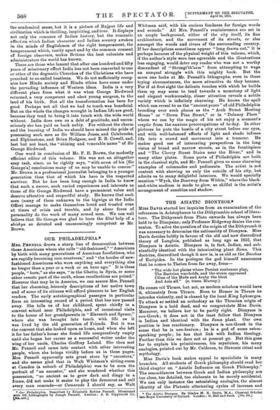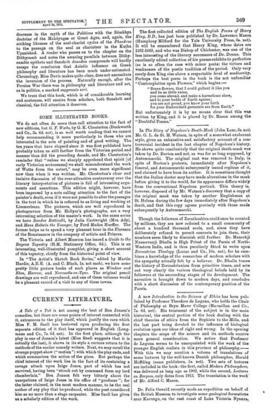THE ASIATIC DIONYSOS.*
Miss Davm started her inquiries from an examination of the references in Aristophanes to the Dithyrambic school of litera- ture. The Dithyramb from Plato onwards has always been held to be Dionysifte; only Professor Ridgeway denies the con- nexion. To solve the question of the origin of the Dithyramb it was necessary to determine the nationality of Dionysos. Mies Davis decides boldly in favour of the old and now discredited theory of Langlois, published as long ago as 1852, that Dionysos is Asiatic. Dionysos is, in fact. Indian, and sub- stantially identical with the intoxicating plant Boma. This doctrine, discredited though it now is, is ae old as the Beeches of Euripides. In the prologue the god himself announces that he comes to Thebes from far away, from— "The wide hot plains where Persian sunbeams play, The Bactrian war-holds, and the storm oppressed Clime of the Reds and Araby the blest
And Asia all." (v. trans. Murray.)
He comes rid Thrace, but not, as modern scholars would have it ultimately from Thrace. Even to Homer in Thrace he intrudes violently, and is chased by the local King Lykoergos. To attack so settled an orthodoxy as the Thracian origin of Dionysos is a bold deed, and we congratulate Miss Davis. Moreover, we believe her to be partly right. Dionysos is non-Greek; it does not in the least follow that Dionysos is Indian and identical with the Some plant. Our own position is lees reactionary. Dionysos is non-Greek in the sense that he is non.kentum ; he-is a god of some oaten. speaking people; be has that link with Indian theology. Further than this we dare not at present go. But this goes far to explain his primitiveness, his mysticism, his many analogies, pointed out by Mr. Calderon, to Slavonic ritual and mythology.
Miss Davis's book makes appeal to specialists in many branches. All students of Greek philosophy should read her third chapter on "Asiatic Influence on Greek Philosophy." The resemblances between Greek and Indian philosophy are too close, too detailed, too elaborate to be merely accidental. We can only instance the astonishing analogies, the almost identity of the Platonic alternating cycles of increase and
• The Asiatic Dionysos. By Gladys N. N. Davis, lf.41., Classical Scholar lite Royal University of Irebwd, London: G. Pell and Bona. 110s. Cal..1 decrease in the myth of the PoWiens with the Simkhya doctrine of the Mahfiyugas or Great Ages, and, again, the striking likeness of the soul-chariot cycles of the Phaedrus to the passage on the soul as charioteer in the Kathy. Upanishad. A reader who passes on to the chapter on the Dithyramb and notes the amazing parallels between Dithy- rambic epithets and Sanakrit domains compounds will hardly escape the conclusion that Asiatic influence on Greek philosophy and literature has been much under-estimated. Chronology, Miss Davis makes quite clear, does not necessitate the inversion of the process. Naturally enough, after the Persian War there was in philosophy and literature and art, as in politics, a marked suppressio seri.
We trust that this book, which is of considerable learning and acuteness, will receive from scholars, both Sanskrit and classical, the full attention it deserves.















































 Previous page
Previous page